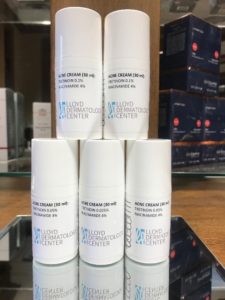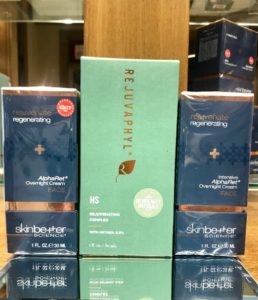Retinoids 101
- Posted on: Oct 26 2018

What Are Retinoids?
A Retinoid is an umbrella term used to describe Vitamin A derivatives. Retinoids are powerful enough to improve overall skin texture, acne marks, discoloration, fine lines and wrinkles, as well as decrease oil production leading to less acne.
How Do Retinoids Work?
In simple terms, retinoids stimulate rapid cell renewal and turn over while also keeping pores free from blockage.
They slow the breakdown of collagen and thicken the deeper layer of skin where wrinkles start.
Retinoids also help improve uneven skin tones and brown spots. It does this by sloughing them off and reducing melanin production.
Prescription vs Non-Prescription
What’s the difference between retinols you can buy in a department store and prescription Retin A?
Medical providers can prescribe Tretinoin (Retin A) which contains Retinoic Acid. These formulations are only available by prescription and contain active ingredients.
Non-prescription “over the counter” products usually contain vitamin A derivatives such as retinol, retinyl palmitate, retinyl acetate, or retinyl linoleate. The biggest difference between the two types are how they work at the cellular level. Retinols are not active products and need to be converted into retinoic acid at the cellular level before they can work. The more steps that the Vitamin A derivative needs to take before it becomes the active retinoic acid, the less potent it becomes. With any non-prescription strength product, it’s important to know what ingredient is being used, and how far it is from being activated.
The active Retinoic Acid product works quickly, but can be associated with more side effects. At the end of the day, Retinols and Retinoic Acids are able to do the same thing, but it may take a lot longer to see results with retinols.

Lloyd Dermatology Center now offers more options of your topical medications available within our office.

Skin Basic offers medical grade cosmeceuticals (non-prescription retinol products)
How To Get Started?
If you are a newbie to Retinols/Retinoids, the trick is to start out slow! Your skin will tolerate the medication if you start out slow and build up your frequency of use.
Retinoids can cause some redness, dryness, and irritation in all skin types, regardless of being dry or oily.
*Only use your retinoid at night as they are deactivated by the sun.
Start out by using a small “Pea Size” amount, once or twice a week. (Monday, Thursday) If you are using it twice a week, space out your days. The goal is to work your way up to nightly usage, but it takes time to get there with prescription strength medications.
If you need to moisturize your skin with the use of retinoids
- Wash your face
- Apply your moisturizer
- Apply your topical retinoid.
*Lloyd Dermatology Center now dispenses more retinoid medications in office.
Retinols are often easier to tolerate on sensitive skin, and an individual can build up their frequency of use quicker with this non-prescription product. Retinols can still cause drying and irritation, so it is just as important to start out slow with usage and build up to every night.
*If you are not a patient at our office and want to find a retinol product that is right for your skin type, visit Skin Basic to discuss our non-prescription products.
Tagged with: anti-aging, cosmeceutical, Dr. Jenifer Lloyd, Lloyd Dermatology Center, prescription medications, retinoids, retinol, RX, Skin Basic
Posted in: What's New?

